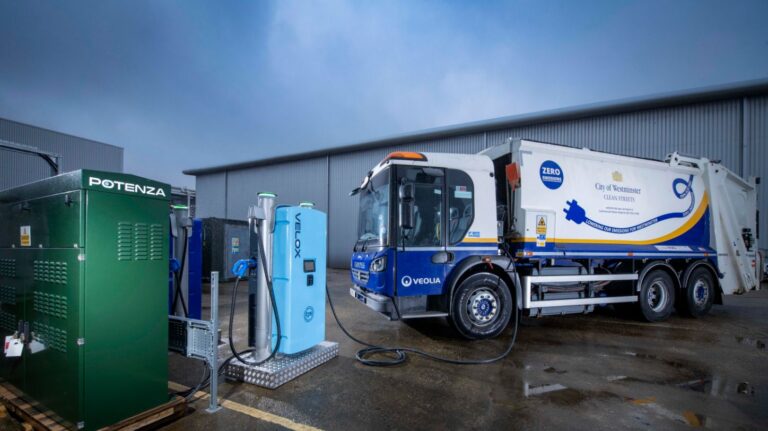Waste collection fleet operator Veolia has completed the first phase of a vehicle-to-grid (V2G) charging trial designed to enable its trucks to power UK homes by feeding back stored energy from their batteries to the grid.
Phase one of the trial saw Veolia enable 110KW of energy to be charged and discharged from two specially designed bi-directional vehicles, enough to supply power to 110 households for more than two hours during peak evening hours.
Phase two will see Westminster City Council refuse collection vehicles (RCVs) collection vehicles pilot the innovation.
In addition, Veolia will use local decarbonising energy from its waste-to-energy plants to power its vehicles, creating a circular loop.
This will include the Landmann Way vehicle depot in North London, powered by low-carbon electricity from the South East London Combined Heat and Power plant.
READ MORE: Brent Council introduces electric collection and street cleansing vehicles
Veolia, which plans to electrify all of its 1,800 RCVs by 2040, said the V2G innovation will enable the company to provide around 200MW of flexible power capacity to the grid daily – equivalent to the evening peak energy demand of more than 150,000 homes.
According to Veolia, RCVs are well suited to V2G as their batteries are six times larger than those in an average car, and the fleet is usually parked at peak energy consumption times for the National Grid.
And with electricity demand in the UK expected to double by 2050 and the government targeting to decarbonise the National Grid by 2035, the trial aims to determine whether electric RCVs could become a flexible energy source to boost energy security.
READ MORE: Kingston Council rolls out new fleet of electric waste-collection vehicles
Gavin Graveson, senior executive vice president, Veolia Northern Europe, said: “Flexibility is the key to super-charging the UK’s energy security and the transition to a smarter and more sustainable market.
“We have to adapt to increasing energy demand and adopt smarter energy systems to bring resilient, dependable and low carbon energy to our homes and businesses.
“Flexibility innovations like this one have the potential to revolutionise the way we manage our energy usage and represent a huge opportunity to cut costs and carbon.”
Veolia has partnered on the project with electric vehicle charger manufacturer Turbo Power Systems, vehicle repower specialist Magnetic Systems Technology and EV chargepoint management software provider Fuuse, with support from technology provider Advantics.
READ MORE: Veolia announces its first EV recycling plant in UK
In the UK, Veolia currently operates 10 energy recovery facilities, which transform around 2.3 million tonnes of non-recyclable waste into electricity for more than 400,000 homes.
A resulting combined generating capacity of 180MWe helps takes pressure off the UK electrical grid and avoids using fossil fuels for generation.
Some of the facilities also produce heating for communities through district heating networks, by using combined heat and power technology.
Achievements and innovations in EV charging will be celebrated at the third annual CiTTi Awards, which will be held on 26 November 2024 at the De Vere Grand Connaught Rooms in London. Nominations officially open in March 2024. Please visit www.cittiawards.co.uk to learn more about this unmissable event for the UK’s transportation sector.





